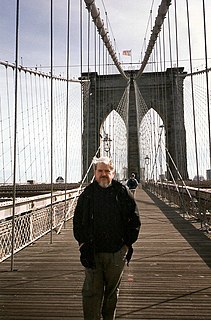Top 33 Quotes & Sayings by William Irwin Thompson
Explore popular quotes and sayings by an American philosopher William Irwin Thompson.
Last updated on December 21, 2024.
Some god or Weltgeist has been making a movie out of us for the past six thousand years, and now we have turned a corner on the movie set of reality and have discovered the boards propping up the two-dimensional monuments of human history. The movement of humanism has reached its limit, and now at that limit it is breaking apart into the opposites of mechanism and mysticism and moving along the circumference of a vast new sphere of posthuman thought.
What is at the higher levels of meaning consciousness is like a hyperspace in which each point is equidistant from the other and where 'the center is everywhere and the circumference is nowhere'? The mythologies of the occult seem like baroque music: there is an overall similar quality of sound and movement, but, upon examination, each piece of music is unique; Vivaldi and Scarlatti are similar and different.

























